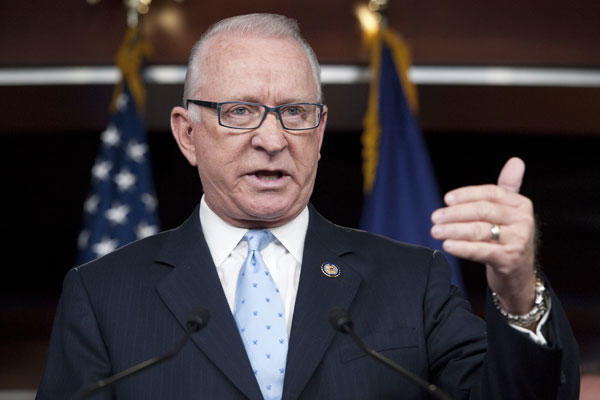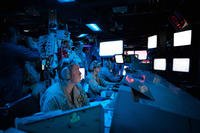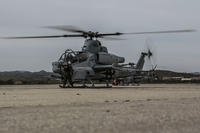President Obama's decision to begin emergency airdrops to besieged Iraqis and strike at the jihadist army threatening them and American personnel in the northern Iraq is drawing bipartisan support.
But GOP lawmakers are also criticizing the president for not acting sooner against the fanatical army – alternately called Islamic State of Iraq and the Levant, ISIL, or Islamic State of Iraq and Syria, ISIS – or taking stronger military action in the country.
"The President's decision to use force in Iraq was appropriate given the circumstances," House Armed Services Committee Chairman Rep. Buck McKeon, R-California, said in a statement on Friday. "It is regrettable that ISIS' rise was preventable, but we must now look forward to the task ahead."
Obama on Thursday directed the Pentagon to get food and water to thousands of members of an ethnic and religious minority whose mountaintop refuge near the Syrian border is surrounded by ISIL militants threatening to kill them. He also authorized the U.S. military to strike at ISIL forces if they threaten the northern city of Irbil, where American diplomats and military advisors are based.
On Thursday night the U.S. airdropped food and water supplies to Yazidi families holed up in on a mountain top near the village of Sinjar, The Associated Press reported Friday. Also, two F/A-18 fighters dropped 500-pound bombs on mobile artillery pieces that fired on Irbil. The fighters deployed to the region from the aircraft carrier USS George H.W. Bush in the Persian Gulf.
House Speaker Rep. John Boehner, R-Ohio, also called Obama's orders appropriate, but said he was dismayed by a long "absence of strategy" for Iraq.
"The president needs a long-term strategy – one that defines success as completing our mission, not keeping political promises – and he needs to build the public and congressional support to sustain it," Boehner said. "If the president is willing to put forward such a strategy, I am ready to listen and work with him."
Sen. John McCain, R-Arizona, in a joint statement with Sen. Lindsey Graham, R-South Carolina, said Obama is right to order the humanitarian aid and military support to defend Irbil, but called the actions "far from sufficient to meet the growing threat" posed by ISIL.
"A policy of containment will not work against ISIS. It is inherently expansionist and must be stopped," said the lawmakers, both known for hawkish views on the Middle East. The two are calling for increased American bombing of ISIL positions in Iraq and in Syria, which has been ravaged by years of fighting by multiple rebel groups opposed to the Assad regime.
ISIL seeks expansionism, having repeatedly stated its intention to establish a caliphate – a Muslim-ruled region – across much of the Middle East.
At the White House on Friday, spokesman Josh Earnest said it's ultimately up to Iraq to put down the ISIL threat. He said the U.S. is ready to lend additional support, including using airpower to help take out ISIL forces threatening the Yazidi, but only if Iraqi and Kurdish forces, working together, take the lead and there is a chance U.S. assistance would "tip the balance" in their favor.
He said additional military support also depends on continued progress by Iraq's leaders to form a government that reflects the spectrum of Iraq's diverse population. The failure of outgoing Prime Minister Nouri al-Maliki to do that, the White House said, resulted in the weakening of Iraq's military forces and made it easier for ISIL to gain a foothold in the country.
McCain and Graham say U.S. actions against ISIL can't wait for political reform in Iraq. "If ever there were a time to reevaluate our disastrous policy in the Middle East, this is it," they said.
Sen. James Inhofe, R- Oklahoma, ranking member of the Senate Armed Services Committee, described Obama's decision to act in Iraq a relief from the administration's "handwringing and indecision" over how to respond to the ISIL threat.
Inhofe, like his GOP counterparts in both chambers of Congress, wants even more U.S. military support, especially for the Kurds.
"I believe a vital component of any strategy must involve direct assistance to the Kurds, who have proven to be a steadfast partner of the United States," he said. "They have shown themselves willing and able to fight against ISIS, but are finding themselves outgunned and need more support."
Earnest, in his Friday press conference with reporters, rejected the notion that Obama hasn't been focused on Iraq or the ISIL threat.
The Obama met with the leaders of Congress just over a week ago on this issue, following a similar meeting in June, Earnest said. And his announcement Thursday authorizing limited airstrikes in Iraq, the president talked to lawmakers from both chambers, including from the armed services and appropriations committee, on how to proceed in the country, he said.
"There's been a genuine and sincere effort on the part of the administration to closely consult with members of Congress on this issue," Earnest said.
-- Bryant Jordan can be reached at bryant.jordan@monster.com




























